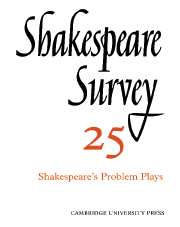Book contents
- Frontmatter
- The Problem Plays, 1920–1970: A Retrospect
- ‘Sons and Daughters of the Game’: An Essay on Shakespeare’s ‘Troilus and Cressida’
- The Options of the Audience: Theory and Practice in Peter Brook’s ‘Measure for Measure’
- Man’s Need and God’s Plan in ‘Measure for Measure’ and Mark iv
- The Design of ‘All’s Well That Ends Well’
- Directing Problem Plays: John Barton Talks to Gareth Lloyd Evans
- The Queen Mab Speech in ‘Romeo and Juliet’
- ‘Time’s Deformed Hand’: Sequence, Consequence, and Inconsequence in ‘The Comedy of Errors’
- Faith and Fashion in ‘Much Ado About Nothing’
- ‘The Merry Wives of Windsor’ as a Hallowe’en Play
- ‘The Tempest’ at the Turn of the Century: Cross-Currents in Production
- Variations Within A Source: From Isaiah XXIX To ‘The Tempest’
- The Life of George Wilkins
- A Neurotic Portia
- Of an Age and for All Time: Shakespeare at Stratford
- The Year's Contributions to Shakespearian Study 1 Critical Studies
- 2 Shakespeare’s Life, Times, and Stage
- 3 Textual Studies
- Index
- Plate section
The Life of George Wilkins
Published online by Cambridge University Press: 28 March 2007
- Frontmatter
- The Problem Plays, 1920–1970: A Retrospect
- ‘Sons and Daughters of the Game’: An Essay on Shakespeare’s ‘Troilus and Cressida’
- The Options of the Audience: Theory and Practice in Peter Brook’s ‘Measure for Measure’
- Man’s Need and God’s Plan in ‘Measure for Measure’ and Mark iv
- The Design of ‘All’s Well That Ends Well’
- Directing Problem Plays: John Barton Talks to Gareth Lloyd Evans
- The Queen Mab Speech in ‘Romeo and Juliet’
- ‘Time’s Deformed Hand’: Sequence, Consequence, and Inconsequence in ‘The Comedy of Errors’
- Faith and Fashion in ‘Much Ado About Nothing’
- ‘The Merry Wives of Windsor’ as a Hallowe’en Play
- ‘The Tempest’ at the Turn of the Century: Cross-Currents in Production
- Variations Within A Source: From Isaiah XXIX To ‘The Tempest’
- The Life of George Wilkins
- A Neurotic Portia
- Of an Age and for All Time: Shakespeare at Stratford
- The Year's Contributions to Shakespearian Study 1 Critical Studies
- 2 Shakespeare’s Life, Times, and Stage
- 3 Textual Studies
- Index
- Plate section
Summary
Very little has hitherto been known about the minor dramatist and pamphleteer, George Wilkins. From all the available evidence, it seems likely that he wrote the first two acts of Pericles Prince of Tyre, and that Shakespeare wrote the last three, apart from the Gower choruses. Several of his works survive, but he is not mentioned by his contemporaries, and hardly any facts about him have come to light. This is the more to be regretted because Pericles is an important experiment. It was the turning-point which led to the other late Romance plays. It is interesting that Shakespeare should have derived half his play, and possibly the original conception, from a minor dramatist like Wilkins. In these circumstances, any information about Wilkins is of particular value.
It is therefore extremely fortunate that a great quantity of such information has been preserved among the records of the seventeenth-century Middlesex Sessions in the Greater London Record Office (Middlesex Section). Professor Mark Eccles seems to be the first and only scholar ever to have pointed this out, in his Christopher Marlowe in London. He writes there that he intends to describe the records in full elsewhere, but, if he did so, it has eluded me and all other writers on Wilkins that I have come across. The Sessions records reveal much about Wilkins that is new, and positively confirm what had already been inferred from other evidence.
- Type
- Chapter
- Information
- Shakespeare Survey , pp. 137 - 152Publisher: Cambridge University PressPrint publication year: 1972
- 7
- Cited by

